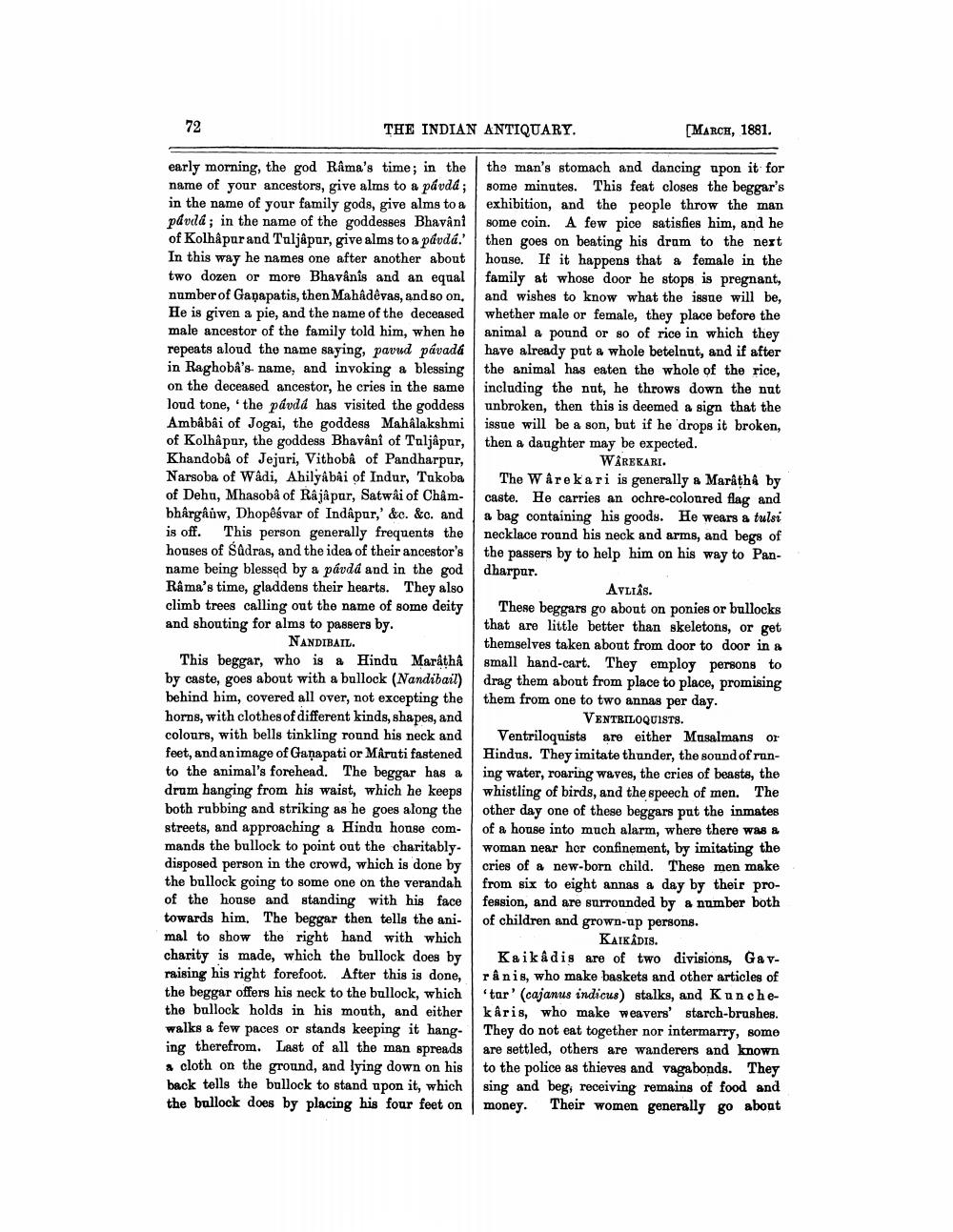________________
72
THE INDIAN ANTIQUARY.
early morning, the god Râma's time; in the name of your ancestors, give alms to a pávdá; in the name of your family gods, give alms to a pávda; in the name of the goddesses Bhavani of Kolhapur and Tuljapur, give alms to a pávdá.' In this way he names one after another about two dozen or more Bhavânîs and an equal number of Ganapatis, then Mahâdêvas, and so on. He is given a pie, and the name of the deceased male ancestor of the family told him, when he repeats aloud the name saying, pavud pávadá in Raghoba's name, and invoking a blessing on the deceased ancestor, he cries in the same loud tone, the pávdá has visited the goddess Ambâbâi of Jogai, the goddess Mahalakshmi of Kolhapur, the goddess Bhavânî of Tuljapur, Khandoba of Jejuri, Vithobâ of Pandharpur, Narsoba of Wadi, Ahilyabai of Indur, Tukoba of Dehu, Mhasobâ of Râjâpur, Satwâi of Châmbhârgânw, Dhopêśvar of Indâpur,' &c. &c. and is off. This person generally frequents the houses of Sudras, and the idea of their ancestor's name being blessed by a pávda and in the god Rama's time, gladdens their hearts. They also climb trees calling out the name of some deity and shouting for alms to passers by. NANDIBAIL.
This beggar, who is a Hindu Maratha by caste, goes about with a bullock (Nandibail) behind him, covered all over, not excepting the horns, with clothes of different kinds, shapes, and colours, with bells tinkling round his neck and feet, and an image of Ganapati or Maruti fastened to the animal's forehead. The beggar has a drum hanging from his waist, which he keeps both rubbing and striking as he goes along the streets, and approaching a Hindu house commands the bullock to point out the charitablydisposed person in the crowd, which is done by the bullock going to some one on the verandah of the house and standing with his face towards him. The beggar then tells the animal to show the right hand with which charity is made, which the bullock does by raising his right forefoot. After this is done, the beggar offers his neck to the bullock, which the bullock holds in his mouth, and either walks a few paces or stands keeping it hanging therefrom. Last of all the man spreads a cloth on the ground, and lying down on his back tells the bullock to stand upon it, which the bullock does by placing his four feet on
[MARCH, 1881.
the man's stomach and dancing upon it for some minutes. This feat closes the beggar's exhibition, and the people throw the man some coin. A few pice satisfies him, and he then goes on beating his dram to the next house. If it happens that a female in the family at whose door he stops is pregnant, and wishes to know what the issue will be, whether male or female, they place before the animal a pound or so of rice in which they have already put a whole betelnut, and if after the animal has eaten the whole of the rice, including the nut, he throws down the nut unbroken, then this is deemed a sign that the issue will be a son, but if he 'drops it broken, then a daughter may be expected. WÂREKARI.
The Warekari is generally a Marâthâ by caste. He carries an ochre-coloured flag and a bag containing his goods. He wears a tulsi necklace round his neck and arms, and begs of the passers by to help him on his way to Pandharpur.
AVLIAS.
These beggars go about on ponies or bullocks that are little better than skeletons, or get themselves taken about from door to door in a small hand-cart. They employ persons to drag them about from place to place, promising them from one to two annas per day. VENTRILOQUISTS.
Ventriloquists are either Musalmans or Hindus. They imitate thunder, the sound of runing water, roaring waves, the cries of beasts, the whistling of birds, and the speech of men. The other day one of these beggars put the inmates of a house into much alarm, where there was a woman near her confinement, by imitating the cries of a new-born child. These men make from six to eight annas a day by their profession, and are surrounded by a number both of children and grown-up persons.
KAIKÂDIS.
Kaikâdis are of two divisions, Gavrânis, who make baskets and other articles of 'tar' (cajanus indicus) stalks, and Kunchekâris, who make weavers' starch-brushes. They do not eat together nor intermarry, some are settled, others are wanderers and known to the police as thieves and vagabonds. They sing and beg, receiving remains of food and money. Their women generally go about




